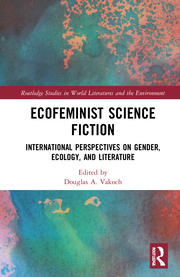
D. A. Vakoch (ed.). Ecofeminist Science Fiction. International Perspectives on Gender, Ecology, and Literature
Ecofeminist Science Fiction
International Perspectives on Gender, Ecology, and Literature
Douglas A. Vakoch (ed.)
ISBN 9780367716417
Routledge
232 Pages
£96.00
PRESENTATION
Ecofeminist Science Fiction: International Perspectives on Gender, Ecology, and Literature provides guidance in navigating some of the most pressing dangers we face today. Science fiction helps us face problems that threaten the very existence of humankind by giving us the emotional distance to see our current situation from afar, separated in our imaginations through time, space, or circumstance. Extrapolating from contemporary science, science fiction allows a critique of modern society, imagining more life-affirming alternatives.
In this collection, ecocritics from five continents scrutinize science fiction for insights into the fundamental changes we need to make to survive and thrive as a species. Contributors examine ecofeminist themes in films, such as Avatar, Star Wars, and The Stepford Wives, as well as television series including Doctor Who and Westworld. Other scholars explore an internationally diverse group of both canonical and lesser-known science fiction writers including Oreet Ashery, Iraj Fazel Bakhsheshi, Liu Cixin, Louise Erdrich, Hanns Heinz Ewers, Larissa Lai, Ursula K. Le Guin, Chen Qiufan, Mary Doria Russell, Larissa Sansour, Karen Traviss, and Jeanette Winterson.
Ecofeminist Science Fiction explores the origins of human-caused environmental change in the twin oppressions of women and of nature, driven by patriarchal power and ideologies. Female embodiment is examined through diverse natural and artificial forms, and queer ecologies challenge heteronormativity. The links between war and environmental destruction are analyzed, and the capitalist motivations and means for exploiting nature are critiqued through postcolonial perspectives.
Table of Contents:
Preface.
Douglas A. Vakoch
Introduction.
Patrick D. Murphy
I. Female Bodies: Plants and Animals, Cyborgs and Robots
Chapter 1. "‘Mothered by the Arid Sand’: Hanns Heinz Ewers’ Alraune with an Ecofeminist Twist."
Melissa Etzler
Chapter 2. "The Runa and Female Otherness in Mary Doria Russell’s The Sparrow."
Lesley Kordecki
Chapter 3. "Reproduction, Utilitarianism, and Speciesism in Sleep Dealer and Westworld."
Imelda Martín Junquera
Chapter 4. "The Living Spaces of Robots: An Ecofeminist Reading of The Stepford Wives."
Katja Plemenitaš
II. Queer Ecologies
Chapter 5. "Anthropocentric and Androcentric Ideologies in Jeanette Winterson’s The Stone Gods: An Ecofeminist Reading."
Aslı Değirmenci Altın
Chapter 6. "Speculative Sex: Queering Aqueous Natures and Biotechnological Futures in Larissa Lai’s Salt Fish Girl."
Sarah Bezan
Chapter 7. "Queering Doctor Who and Supernatural: An Ecofeminist Response to Bill Potts and Charlie Bradbury."
Meghna Mudaliar
III. War and Ecoterrorism
Chapter 8. "No Easy Answers: Karen Traviss’s The Wess’har Wars Series."
Patrick Murphy
Chapter 9. "‘The Force Is Strong with This One’: A Material Feminist Approach to Star Wars."
Başak Ağın
Chapter 10. "Chinese Science Fiction and Representations of Ecofeminists: Women Warriors and Madwomen."
Peter I-min Huang
IV. Capitalism and Colonization
Chapter 11. "Hegemonic Masculinity and Tropes of Domination: An Ecofeminist Analysis of James Cameron’s 2009 Film Avatar."
Lydia Rose and Teresa M. Bartoli
Chapter 12. "Eco-Heroines and Saviors in Iraj Fazel Bakhsheshi’s Men and Supertowers and The Sun’s Sons."
Zahra Jannessari Ladani
Chapter 13. "Rethinking Resistance: An Ecofeminist Approach to Anti-Colonialism in Louise Erdrich’s Future Home of the Living God and Oreet Ashery and Larissa Sansour’s The Novel of Nonel and Vovel."
Benay Blend
Chapter 14. "The Road to Sinshan: Ecophilia in Ursula K. Le Guin’s Early Hainish Novels."
Deirdre Byrne